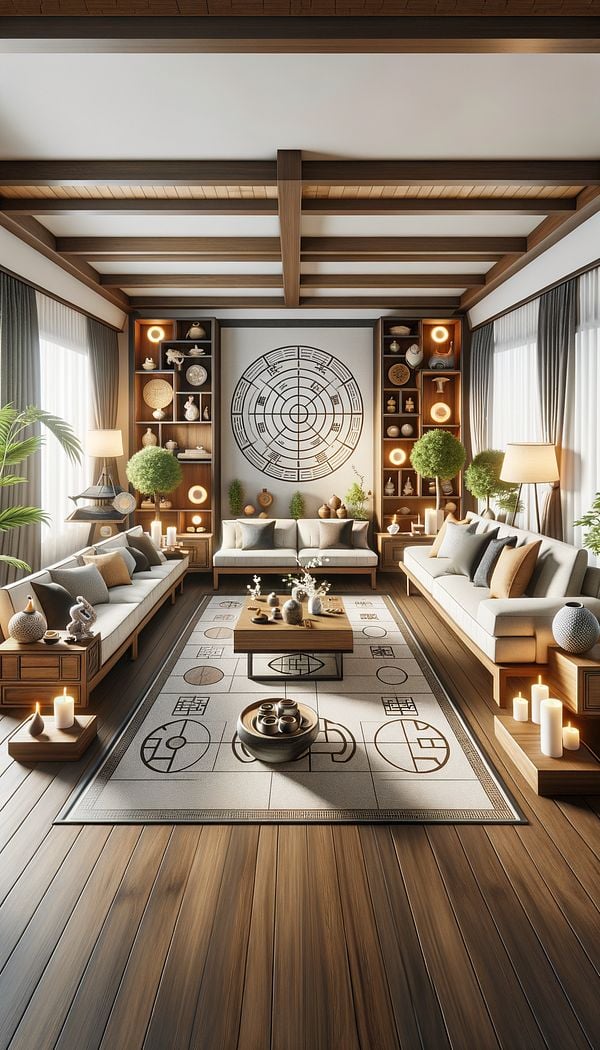What is Feng Shui?
Feng Shui is an ancient Chinese practice of arranging living spaces to create harmony and balance with the natural world.
Description
Feng Shui, which directly translates to “wind” (feng) and “water” (shui), is an integral part of Chinese culture, deeply rooted in Taoist principles that emphasize living in harmony with one’s environment. This ancient practice involves organizing and decorating spaces in a way that allows for a smooth flow of chi (energy), with the aim to enhance wellbeing, prosperity, and happiness.
The principles of Feng Shui involve the use of the Bagua map, a tool that helps categorize different areas of a space according to specific aspects of life they influence, such as wealth, health, or relationships. Each section of the Bagua map corresponds to different elements (wood, fire, earth, metal, and water) and directions, which guide the placement of objects, colors, and materials within a space.
By integrating furniture, decor, and architectural elements mindfully, Feng Shui seeks to optimize energy flow and create spaces that are balanced and harmonious. It’s not merely a design philosophy; it’s a holistic approach that considers the dynamic interaction between humans and their environments.
Usage
In interior design, Feng Shui can be applied in various ways, such as positioning furniture to enhance communication within a living room, selecting specific colors to boost productivity in a home office, or arranging a bedroom for better sleep quality based on the Bagua map. Businesses often use Feng Shui principles when designing office spaces to improve employee wellbeing and attract prosperity.
FAQs
-
How does Feng Shui differ from other interior design philosophies?
Feng Shui is unique in its focus on creating harmony between the environment and its inhabitants through the flow of chi (energy). Unlike traditional interior design, which may prioritize aesthetics and functionality, Feng Shui places equal importance on spiritual and physical wellbeing, using the Bagua map and elemental forces to guide design choices.
-
Can Feng Shui principles be applied in modern homes?
Absolutely. Feng Shui is a versatile practice that can be integrated into any architectural style or living space, regardless of size or age. Modern implementations of Feng Shui might involve selecting furniture placements that promote positive energy flow or using specific colors and materials that resonate with the home’s Bagua areas.
-
Do I need to believe in chi to benefit from Feng Shui?
While belief in chi and the spiritual aspects of Feng Shui can enhance the experience, it's not strictly necessary. Many principles of Feng Shui, such as decluttering and thoughtful space planning, are beneficial practices for creating a comfortable and efficient living environment, regardless of one's beliefs.
Practical Application
When applying Feng Shui, start by decluttering your space to allow for uninhibited flow of energy. Use the Bagua map as a guide to identify key areas of your life you wish to enhance or balance, and adjust your space accordingly. Incorporate the five elements strategically to support different life areas, and consider the placement of furniture and objects to encourage positive energy flow. Remember, the goal of Feng Shui is to create a harmonious and balanced environment that supports your wellbeing and goals.
-
Historical Periods & Movements150 articles
-
Space Planning & Layout134 articles
-
Decorating Principles & Elements330 articles
-
Color & Patterns154 articles
-
Sustainability & Eco-Friendly Design69 articles
-
FoundationFoundation refers to the lowest load-bearing part of a building which is typically situated below ground level.
-
VoileVoile is a lightweight, sheer fabric, often used in soft furnishing and garments.
-
Negative SpaceNegative space refers to the area around and between objects in a room.
-
UVC - Ultraviolet CUVC, or Ultraviolet C, is a type of ultraviolet light with germicidal properties.
-
Comb BackA distinctive chair design characterized by a series of vertical spindles that stretch upwards to form a high backrest.
